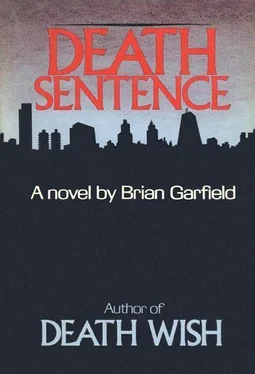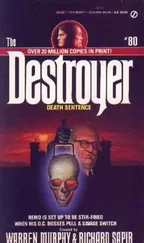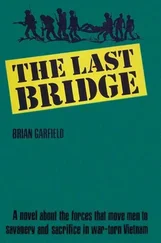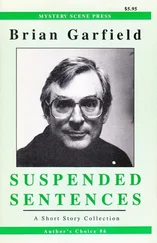The old man was at home with an audience. Other conversations around them had dwindled; people were turning to listen to him; Chisum’s enthusiasms waxed visibly. His gestures grew larger. “These vigilantes may think they’re doing something for society, but they’re only acting out their own pathetic fantasies. Look. If there’s a heavy snowstorm and a big building collapses, it’s no good blaming the blizzard. You’ve got to go after the architect who designed the building. You’ve got to try and persuade him to change his architectural system.
“That’s our problem. The architects are immobilized by outdated archaic traditions — the millions of laws on the books. And too many architects have been corrupted, they cut corners with cheap building materials and substandard construction standards. That’s the plea-bargaining system, the cops and judges who sell themselves as casually as street-walking whores.
“And the public? The public is the buyers and renters of the building. They don’t want to see enough money spent to insure a sound structure. They’d rather cut corners and take a chance there won’t be a blizzard.”
Spalter said, “You can’t really say the public doesn’t give a damn. What about this hue and cry about crime?”
“People are concerned that the building might collapse. But they don’t act on that concern. The most widespread disease in this country is the sense of personal powerlessness. Impotence. It breeds apathy, and apathy breeds the violence of crime and vigilantism. The more powerless people become, the more violent they become — revolutionaries are always the powerless people.”
“These criminals and vigilantes,” Paul said. “Are they revolutionaries?”
“I think their motives are the same, essentially. They’re disaffected by their powerlessness and they’re seduced by violence because it’s the only way they can express anger with their frustration and impotence.”
Paul saw John Childress nearby. Childress was smiling. “Harry, take a bow. You’re doing a spectacular job of belaboring the obvious.”
Chisum regarded his host with arch good-humored contempt. “The obvious becomes less obvious, John, when you consider the fact that we’re completely stymied by two opposing forces — and that both of them come from exactly the same political source. One: the obsession with bringing in the government to correct every last flaw in the human condition. Obviously that makes the government more and more powerful, and the citizens less and less powerful. Two: the pathological fear of a possible misuse of power. The checks and balances.
“You see?” he demanded. “First we create a government with ever increasing power. Then we spend every waking hour finding ways to prevent that power from being used against us. It’s total stalemate.”
“Nothing can happen from the top, you mean,” Spalter said.
“Right now it’s only happening from the bottom, isn’t it. Crime — and vigilantism.”
“Then what’s the answer?”
Chisum waved his age-spotted hands as if parting waves in a bathtub: deprecating, dismissing, minimizing. “The answer is the old human answer which we’re too sophisticated to believe. Common sense. The democratic simple-minded fundament: the greatest good for the greatest number.”
“Harry,” John Childress said, “kindly eschew obfuscation.”
“The answer consists, my brilliant warped friend, of a complicated combination of simple obvious reforms.”
“To wit?”
“My book will list them all. I’ll give you a few examples.”
The professor held up his hand and lifted one finger at a time in enumeration.
“One. Stop arresting drunks. They’re hurting nobody but themselves.
“Two. Stop arresting gamblers, prostitutes and the perpetrators of all other so-called victimless crimes.
“Three. Stop arresting drug addicts. Make narcotics cheap and easy to buy — on a par with alcohol and tobacco. This one always causes outraged indignant screams, but it’s only common sense. It won’t eliminate addiction. Nothing will. But it will eliminate crimes that the addicts commit in order to get money to buy the drugs that feed their habits. If they can get drugs cheaply they won’t need to mug us. I submit that’s more important than the self-inflicted ‘crime’ of addiction itself. If your son becomes a drug addict, that’s his problem. But if he robs me to get money to buy drugs, he makes it my problem. I seek to eliminate my problem by making his drugs available to him cheaply. It’s that simple. I’m not solving his problem — his addiction is a medical problem and that’s between him and his doctor — but I am solving my problem, and, by extension, society’s.
“Four. Tax every American citizen the sum of twenty dollars. With the money obtained, build prisons and courtrooms and staff them. Eliminate the bargained plea, the money bail system, and all systems of probation, parole and suspended sentences, except in extraordinary cases where there are abundant mitigating circumstances. Segregate these new expanded prisons according to severity of offense, in order to prevent hardened criminals from influencing minor offenders. Reduce penalties for minor infractions, but increase penalties for major offenses, and make them uniform. Take the power to set sentences out of the hands of judges and make the sentence for each offense depend on the crime, not the judge. In other words, five years — no flexibility — for any armed robbery first offense, and fifteen years for every second armed robbery and life imprisonment for every third offense. Why? Not to punish, not to rehabilitate, not to reform. But simply to keep the offenders isolated from society where they cannot victimize us again.”
Spalter interrupted him: “What about the death penalty?”
“The only remote justification for the death penalty” is the economic one. It is cheaper to execute a man than it is to sustain him in prison for life. But the value to society of life imprisonment only holds water when it really means life imprisonment — not seven years with time off for good behavior.
“Incidently there’s good reason to reduce the penalty for most murders. Most homicides are committed within families — husband against wife, that kind of thing. The likelihood of the murderer’s ever repeating his crime is usually remote; the crimes are committed in unique moments of passion, and anyway a woman who knowingly marries a man who killed his previous wife has to know the risk she’s running. I’d say five years in prison would be a sensible penalty for internecine homicide.”
“Where do vigilantes fit into your scheme?” Irene asked.
“Premeditated murder outside the family group,” he answered promptly. “If convicted, mandatory life imprisonment. Or the death penalty if society prefers.”
“A lot of people would disagree with that,” Spalter said. “A lot of people would rather have the vigilante run for mayor.”
The room broke up in laughter.
Paul said to Irene, “I see where you got some of your ideas.”
Childress had an arm around the professor’s shoulders; he was walking Chisum toward the bar, talking with sarcastic emphasis. The crowd milled and reformed its earlier knots of conversation and Paul heard words like impractical, visionary, sensible, utopian, cops, muggers, judges, lawyers, crime, prison, safety, civil war. And, he heard, vigilante.
¶ Chicago, Dec. 28th— Two 14-year-old boys were slashed to death late last night by a 64-year-old man whom they are accused of having tried to rob.
The boys, Richard White, of 6513½ S. Paulina, and Michael Hayes, of 7418 S. Hermitage, cut with a kitchen knife in an alley near Kostner and Van Buren, fled from the alley and ran nearly 200 feet on Van Buren before they collapsed. Both boys died of their wounds almost immediately thereafter.
Читать дальше










